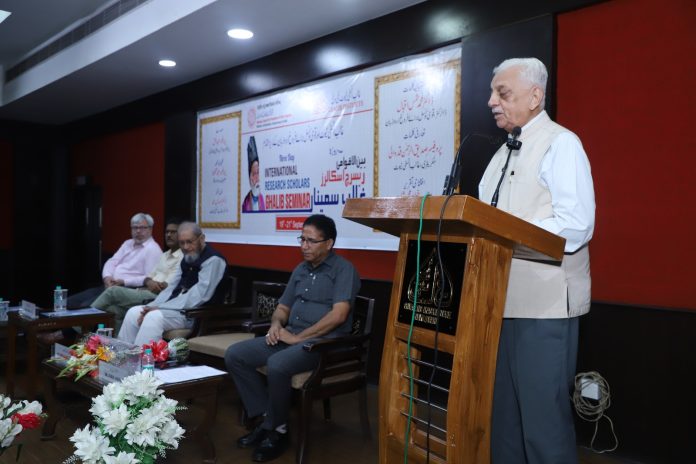Three-Day International Research Scholars Ghalib Seminar Inaugurated by Ghalib Institute and National Council for Promotion of Urdu Language
New Delhi: “The International Research Scholars Ghalib Seminar serves as a training ground for new entrants. There is no single prescribed theme for this seminar.” These views were expressed by Prof. Ahmad Mahfuz while delivering the keynote address at the three-day seminar jointly organised by the Ghalib Institute and the National Council for Promotion of Urdu Language (NCPUL) here Friday.
He added that the field of research is vast, and when it relates to language and literature, its scope becomes even broader, as literature inherently involves a wide range of sciences and disciplines.
Dr. Shams Iqbal, Director of NCPUL, in his welcome remarks, said that familiarity with multiple languages can yield highly positive results in research, because in research, not only material but methodology also holds great importance. When we know other languages, we can also adopt their better methods.
Mr. Khwaja Mohammad Shahid, former Vice-Chancellor of Maulana Azad National Urdu University (Hyderabad), while inaugurating the seminar, recalled: “During my studies in Aligarh, I had read Malik Ram Sahib’s essay on research. I don’t remember it fully now, but it defined research as the process of distinguishing between the genuine and the counterfeit. When I compare that with today’s research, the situation does not appear promising. I receive many Urdu journals, but when I noticed a decline in quality, I even wrote letters to editors, urging them to pay attention. The responsibility does not rest solely on research scholars, but also on the education system, which has fostered a culture of complacency.”
The session was presided over by Prof. Abdul Haq, who in his presidential address said, “We need to establish a Ghalib Research Chair, which would help promote a strong research culture in Urdu. Institutions must engage individuals who truly possess a research-oriented temperament.”
Dr. Idrees Ahmad, Director of Ghalib Institute, remarked, “The Research Scholars Seminar is our identity, and we will make every effort to continue it. But scholars must also consider it their own and extend full cooperation. We strive to gather Urdu scholars from every state of the country to foster intellectual exchange.”
Two technical sessions were held on the first day.
The First Session was chaired by Prof. Farooq Bakhshi, who stated that it is not entirely correct to argue that PhDs should not be done on personalities. “If the personality is someone like Nasir Kazmi, Intizar Husain, or Shahryar, then certainly research is worthwhile. But there have also been PhDs on personalities who did not truly deserve it, and such trends should be avoided.” This session was moderated by Syed Anwar Safi. Presentations included “Echo of Social Issues in the Poetry of Forugh Farrokhzad” by Nikhat Zehra; “Vilayat Jafri as a Short Story Writer” by Saubia Siddiqui; “Scholarly and Literary Contributions of Urdu Institutions in Uttar Pradesh” by Abdullah; and “Analytical Study of Shaukat Hayat’s Short Story ‘Waba’” by Darkhshan.
The Second Session was chaired by Prof. Chandrashekhar, who advised: “Before writing on a subject, one must review what has already been written; otherwise, we may mistakenly believe our points are being made for the first time.” Papers presented included “Basti and Pinjar: Analysis of Migration, Nostalgia, and Historical Consciousness” by Mehr-un-Nisa; “The Lost Star of Eastern U.P. – Hindi Gorakhpuri” by Nadia Khan; “A Brief Review of Maulana Abul Kalam Azad’s Literary Services and Tarjuman-ul-Qur’an” by Zabiullah Azad; and “Husain-ul-Haq: A Trailblazing Fiction Writer” by Mohammad Aslam Azad.
The remaining sessions of the seminar will continue on September 20 and 21, from 10 AM to 5 PM at Aiwan-e-Ghalib.




